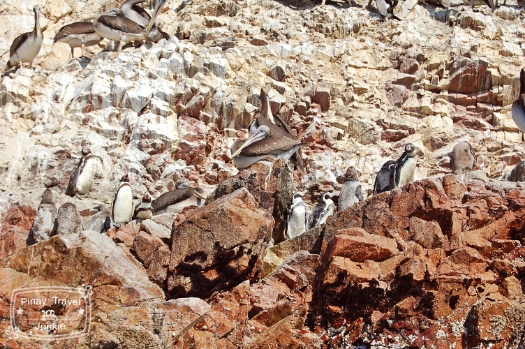
Paracas’ teensy port was bedlam, early Wednesday morn. Rows and rows of tourists, craning their necks to see which queue boards next, were uncontestably antsy. So was our toddler Luna. Poor thing was recovering from a fever. It was day 211 of our round-the-world trip, and she just turned sixteen months. Such milestone we were to celebrate by watching wildlife on Islas Ballestas, in the Ica Region of south Peru.
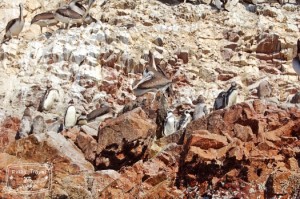
At quarter past nine, our guia (guide) finally motioned for us to come forward. It was our turn to board. The piloto instructed hubby and me, the only parents lugging a toddler amongst the group, to choose a seat in front. Thankfully the place we were eyeing. We certainly didn’t want Luna to bathe in splashes of cold sea water at the back of the boat.
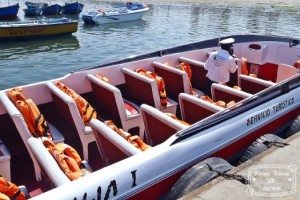
We quickly put on our life vests and plopped on our seat. The sun’s rays grew fierce (A bit of pre-trip reading warned us about the roofless speedboats hence our slathering of dollops of sunscreen.), but groggy Luna managed to doze off. Our boat thrummed to life as soon as everyone piled in. It was our guia’s cue to begin his lecture, which was delivered in Spanish and English. The sea was fairly calm, and the only bumps we endured were caused by slices of waves from other speedboats that overtook us.
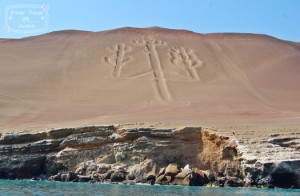
The engine was switched off when we drifted near the El Candelabro, a 420-foot geoglyph etched into a cliff on the Paracas peninsula. Its history and purpose still unknown. Not much to discuss there obviously so we pushed on after two minutes, to the dismay of our trigger happy Spanish speaking tourmates.
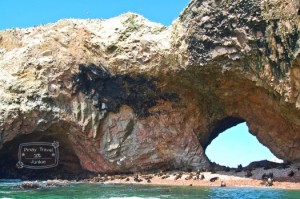
It took a little over half an hour to get to Islas Ballestas. We first caught sight of sea lions lazing on the pebble beach. They seemed unmindful of our presence. Our guia even claims that a few of them sometimes swim alongside the boats. Uhm, doesn’t sound safe for show off seals, don’t you think?
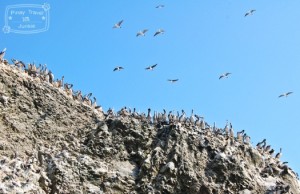
Because the rocky islands of Islas Ballestas is protected, boats aren’t allowed to dock. We merely did sightseeing from a safe distance. Besides there’s too much guano spread around the islands. Guano, in case you don’t know, is seabird and seal dung, and is extracted as fertilizer and ingredient for gunpowder since the 1840s. Imagine trampling on squishy excrement as part of your itinerary, not appealing ei? Prolly an affront to your senses, but this shiz is like, a gargantuan business for Peruvians.
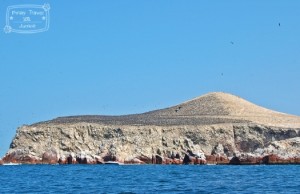
So what attracts sea lions and different bird species to these offshore islands? The Humboldt Current (named after naturalist Alexander von Humboldt) flowing through the area pulls up nutrient-rich water from the ocean floor to the ocean’s surface which brings about an ideal feeding zone for small fishes. Thereupon… (Yawn)… Beckons sea lions and sea birds that feed on them.
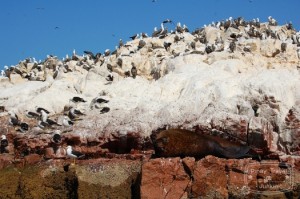
Did I just bore you there? Oh peaking of Humboldt, I secretly wept when I finally saw the Humboldt penguins (This crybaby moment may not be new to you if you’ve read what happened in Macau’s Giant Panda Pavilion.). It was my first time to actually see penguins, and I’m quite proud to say that I saw them in the wild. No zoo can can beat that experience.
After two hours, we were back in Paracas’ port. The trip to the so-called “poor man’s Galapagos” was nothing short of amazing. Well worth the 35 soles (about $14) that we paid each. And I can hardly wait to see the real Galapagos, perhaps when I’m a poor man no more.
Round-The-World 2012, Peru Leg:
Huaca Pucllana, Lima, Peru: The Ruins And The Red Balloon
El Zaguan B&B, Lima, Peru

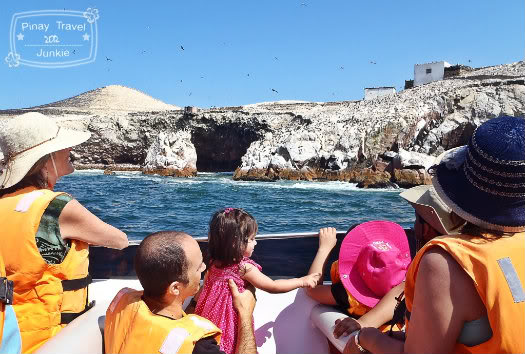
I love penguins and I’m gonna die seeing a real one..for sure:)
Sis, thank you for the bits of information with this beautiful place:) bonggels tlga mga travel mo:)
Aww, high five fellow penguin fan!
Would love to see Penguins in the wild too! 🙂 I love the photos Gaye! 🙂
Thanks Riz!
Wow andaming penguins!! Nahiya naman ako dahil sa Jurong bird park ako nakakita ng penguins.hehe Parang lightning rod yung El Candelabro.
Hahaha! It looks like a cactus to me!
Good for you to see them in wild. 🙂
Your travel stories are inspiring. I don’t know how you do it–you make me want to strap on a backpack, too, and travel the way you do.
Wee! That’s awesome to hear Chin 🙂
Hello Gaye, as usual, your post makes me wanna travel right away! Cheers to more travels and I am sure you´and your family will make it to the real Galapagos, soon.
I do hope so, Julai. Maybe not that soon, but in the distant future 🙂
i am always reminded of happy feet when i see islands full of penguins. and yeah, seeing animals in the wild beats any visit to the zoo any day.
I really love penguins! The first time I saw one, i was really jumping *i was twenty then and along with lil kids 3-7yrs old* ahh the kid in me kicked in! How much more naman if makita ko sila sa talagang natural habitat nila.. walang katulad tlga mga travels mo <3
xx, WANDER SHUGAH
Paul, yesss! Reminiscent of Happy Feet.
Shugah, hahaha! Cute! I’d prolly feel the same when I visit uhm, San Rio Land someday.
Na curious aq dun sa El Candelabro:) luv to see birds and sea lions on the wild
What an awesome experience and definitely beats seeing penguins in the zoo. Did Luna get to enjoy the wildlife? I love penguins and how cool to see them in mass quantities in the wildlife. El Candelabro sounds intriguing.
Luna woke up from her nap and was able to see some 🙂
Aww the photos are awesome pang NatGeo!! Sa Japan palang ako nakakita ng penguin, dito parang kaakiba chura nila.
never pa ako nkakakita ng penguin.. Pinay travel junkie u help me to dream more pa .. nakakainspire sana mkkita n ako ng penguin at tsaka bear!
I’m surprised to see your little one was not wearing a life vest – or they didn’t expect one as young as her doing this kind of tour?
The Candelabro looks just like those seen in the Nazca lines.
Hi Dennis! Tots are required to wear the life jacket whilst the boat is in transit. They let us remove her vest when we’re just bobbing on the water. She’s annoying everyone anyways cause she didn’t stop crying til we took it off! LOL.